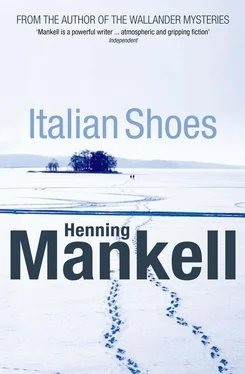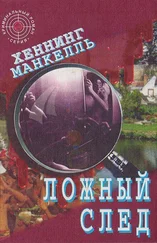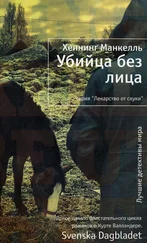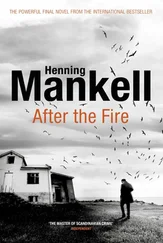I eventually struggled to my feet and sat down on a chair.
‘Why did you do that?’
‘I’m sorry. I didn’t mean to. The loneliness I have to put up with here is driving me mad.’
‘I don’t believe you. You may well be lonely, I don’t know anything about that. But that’s not why you attacked me.’
‘I hope you can forget it. Please forgive me. I shouldn’t drink alcohol.’
She put the knife down and stood in front of me. I could see her anger and her disappointment. There was nothing I could say. Suddenly I felt truly ashamed.
Agnes sat down in the corner of the kitchen sofa. She had turned her face away and was gazing out of the dark window.
‘I know it’s unforgivable. I regret what happened, and wish I could undo it.’
‘I don’t know what you imagine you were doing. If I could, I’d leave here immediately. But it’s the middle of the night, it’s not possible. I’ll stay here until tomorrow.’
She stood up and left the kitchen. I heard her jamming the door handle with a chair. I went outside and tried to look in through the window. She had switched the light off. Perhaps she sensed that I was standing outside, trying to see her. The dog appeared out of the darkness. I kicked her away. I couldn’t cope with her just now.
I lay awake all night. At six o’clock I went down to the kitchen and listened outside her door. I couldn’t make out if she was asleep or awake. At a quarter to seven she opened the door and stepped out into the kitchen, rucksack in hand.
‘How do I get away from here?’
‘It’s dead calm at the moment. If you wait until it gets light I can take you to the mainland.’
She started to pull on her boots.
‘I want to say something about what happened last night.’
She raised her hand immediately.
‘There’s nothing else to say. You are not the person I thought you were. I want to get away from here as quickly as possible. I’ll wait down by the jetty until it gets light.’
‘Can’t you just hear what I have to say at least?’
She didn’t answer but hung her rucksack over one shoulder, picked up Sima’s suitcase and sword, and vanished into the darkness.
It would soon be light. I could see that she wouldn’t listen if I went down to the jetty and tried to talk to her. Instead I sat down at the table and wrote her a letter.
‘We could move your girls here. Leave the sisters and the village in peace. I have planning permission to build a house on the stone foundation of the old barn. The boathouse has a room attached that can be insulated and furbished. There are empty rooms here in the main house. If I can accommodate one caravan here, there’s no reason why I shouldn’t have another. There’s plenty of room on the island.’
I walked down to the jetty. She stood up and clambered down into the boat. I handed her the letter without saying anything. She hesitated before accepting it and stuffing it into her rucksack.
The sea was as smooth as a mirror. The sound of my outboard motor ripped open the stillness, scattering a few ducks, which flew out to sea. Agnes sat in the bows with her back towards me.
I hove to by the lowest part of the quay and switched off the engine.
‘A bus goes from here,’ I said. ‘The timetable is over there, on the wall.’
She climbed up on to the quay without saying a word.
I returned home and went to sleep. In the afternoon I dug out my old Rembrandt puzzle and tipped the pieces on to the kitchen table. I started from the beginning, knowing I would never finish it.
A north-easterly gale blew up the day after Agnes had left. I was woken up by a window banging. I got dressed and went to check that the boat was securely moored. It was high tide and waves were breaking over the jetty and slapping against the boathouse wall. I used a spare piece of rope to doubly secure the stern. The wind was howling around the walls. When I was a boy the howling gales used to scare me stiff. Inside the boathouse during a storm the noise is tremendous: like the voices of people screaming and fighting. Nowadays, strong winds make me feel secure. As I stood there I felt beyond the reach of anything and everything.
The storm continued to rage for two more days. On the second day, Jansson managed to reach the island. For once, he was late. When he finally arrived, he told me his engine had cut out between Röholmen and Höga Skärsnäset.
‘I’ve never had any problems before,’ he said. ‘Typical that the engine should conk out in weather like this. I had to throw out a drag anchor, but even so I very nearly ended up on the rocks at Röholmen. If I hadn’t managed to get the engine going again, I’d have been wrecked.’
I’d never seen him so shaken. For once, I asked him to sit down on the bench while I took his blood pressure. It was a bit on the high side, but nothing like what one might have expected, given what he had been through.
He got back into his boat, which was bumping and scraping against the jetty.
‘I haven’t got any post for you,’ he said, ‘but Hans Lundman asked me to bring you a newspaper.’
‘Why?’
‘He didn’t say. It’s yesterday’s.’
He handed me one of the national dailies.
‘Didn’t he say anything at all?’
‘He just asked me to give it to you. He doesn’t waste words, as you know.’
I pushed out the bows as Jansson started reversing into the teeth of the gale. As he turned he very nearly ran aground in the shallows. But at the last moment he squeezed enough power from the engine to get out of the inlet.
As I left the jetty I saw something white floating just off the shore where the caravan was standing. I went to investigate and saw that it was a dead swan. Its long neck slithered like a snake through the seaweed. I went back to the boathouse, placed the newspaper on the tool bench and put on a pair of working gloves. Then I picked the swan up. A nylon fishing line had dug deeply into its body and become entangled in its feathers. It had starved to death as it hadn’t been able to search for food. I carried it up and laid it on the rocks. It wouldn’t be long before the crows and sea gulls ate the carcass. Carra came to investigate and sniffed at the bird.
‘It’s not for you,’ I said. ‘It’s for other hungry creatures.’
I suddenly grew tired at the prospect of the jigsaw puzzle, walked to the boathouse and fetched one of my flat-fish nets, sat down in the kitchen and started to repair it. My grandfather had taught me how to splice ropes and mend nets. The techniques and know-how were still there in my fingers. I sat there working until dusk fell. In my head I conducted a conversation with Agnes about what had happened. Reconciliation is possible in the world of the imagination.
That evening I ate the rest of the chicken. When I’d finished, I lay down on the kitchen sofa and listened to the wind. I was just going to switch the radio on and listen to the news when I remembered the newspaper Jansson had brought with him. I took my torch and walked down to the boathouse to get it.
Hans Lundman rarely did anything without a specific purpose. I sat at the kitchen table and started to scrutinise the newspaper to find what he wanted me to see.
I found it on page four, in the section devoted to foreign news. It was a picture from a top-level meeting for leading European statesmen — presidents and prime ministers. They had lined up to be photographed. In the foreground was a naked woman holding up a placard. Underneath the picture were a few words about the embarrassing incident. A woman wearing a black raincoat had succeeded in entering the press conference, using a forged pass. Once inside, she had taken off the raincoat and lifted up her placard. Several security guards had quickly hustled her away. I looked at the picture, and felt a pain in my stomach. I had a magnifying glass in one of the kitchen drawers. I examined the picture again. I became increasingly worried as my suspicions were slowly confirmed. The woman was Louise. It was her face, even if it was slightly averted. There she was, making a triumphant and challenging gesture.
Читать дальше












